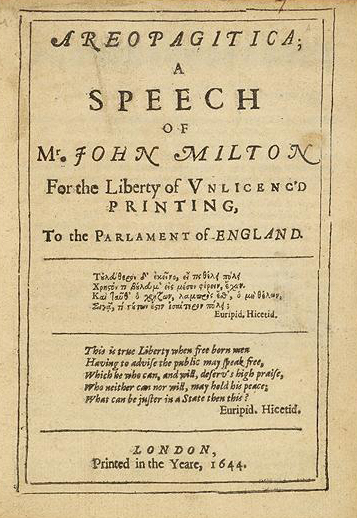By: Kevin Grace
On the south parapet of Blegen Library are carved these words from John Milton’s Areopagitica written in 1644:
For books are not absolutely dead things
But do contain a potencie of life in them
To be as active as those whose progeny they are.
 Milton (1608-1674) is one of the greatest poets and essayists in the English language. The quote, which is part of his work condemning censorship and pleading for free speech, is part of the architectural design in the library, which opened as the University of Cincinnati’s Main Library in 1930. Intended to inspire students and scholars, they are words meant both to establish the primacy of books and the written word in human culture and to draw the reader within the building to explore, to learn, to consider, and to share knowledge.
Milton (1608-1674) is one of the greatest poets and essayists in the English language. The quote, which is part of his work condemning censorship and pleading for free speech, is part of the architectural design in the library, which opened as the University of Cincinnati’s Main Library in 1930. Intended to inspire students and scholars, they are words meant both to establish the primacy of books and the written word in human culture and to draw the reader within the building to explore, to learn, to consider, and to share knowledge.
The Department of English and Comparative Literature sends this information for a lecture this Friday at 1:00 pm in 814 Blegen, the Schott Seminar Room in the Archives & Rare Books Library:
This Friday, April 11, John Rumrich will be on campus to give a talk called “Reading Blood.” In a talk that will focus on Milton (1608-1674), he will be exploring the issue that he calls the “personhood of a book.” We talk freely about books as friends—or enemies—and assign various kinds of agency to them, but what do we really mean by that? Milton’s defines “A good Booke” as “the precious life-blood of a master spirit imbalm’d and treasur’d up on purpose to a life beyond life.” But this definition has never really been satisfactorily explained. Perhaps his definition has been so often quoted or engraved on library walls that it seems too obvious and familiar to require a gloss. Yet the equation between “a good book” and “lifeblood,” specifically the “lifeblood of a master spirit” implies a question, at least to the literal-minded: what does it mean to read blood?
 John Rumrich is the Thaman Professor of English at the University of Texas at Austin, where he teaches Milton, Shakespeare, and Seventeenth Century Poetry. The author of Milton Unbound and Matter of Glory, he has recently co-edited a collection of essays on Milton and Heresy and the Norton Critical Edition of Seventeenth Century British Poetry. He has been a visiting scholar in China and was interviewed on NPR for Milton’s 400th birthday. While he is in Cincinnati, he will be doing research on the Archives & Rare Books Library’s anthropodermically-bound edition of Phillis Wheatley’s poetry.
John Rumrich is the Thaman Professor of English at the University of Texas at Austin, where he teaches Milton, Shakespeare, and Seventeenth Century Poetry. The author of Milton Unbound and Matter of Glory, he has recently co-edited a collection of essays on Milton and Heresy and the Norton Critical Edition of Seventeenth Century British Poetry. He has been a visiting scholar in China and was interviewed on NPR for Milton’s 400th birthday. While he is in Cincinnati, he will be doing research on the Archives & Rare Books Library’s anthropodermically-bound edition of Phillis Wheatley’s poetry.
Professor Rumrich’s lecture is free and open to the UC community and to the public. After his talk, a tour will be offered of Blegen Library and its extensive architectural elements that extol the heritage of education and the history of the book, which includes the Milton quote.
